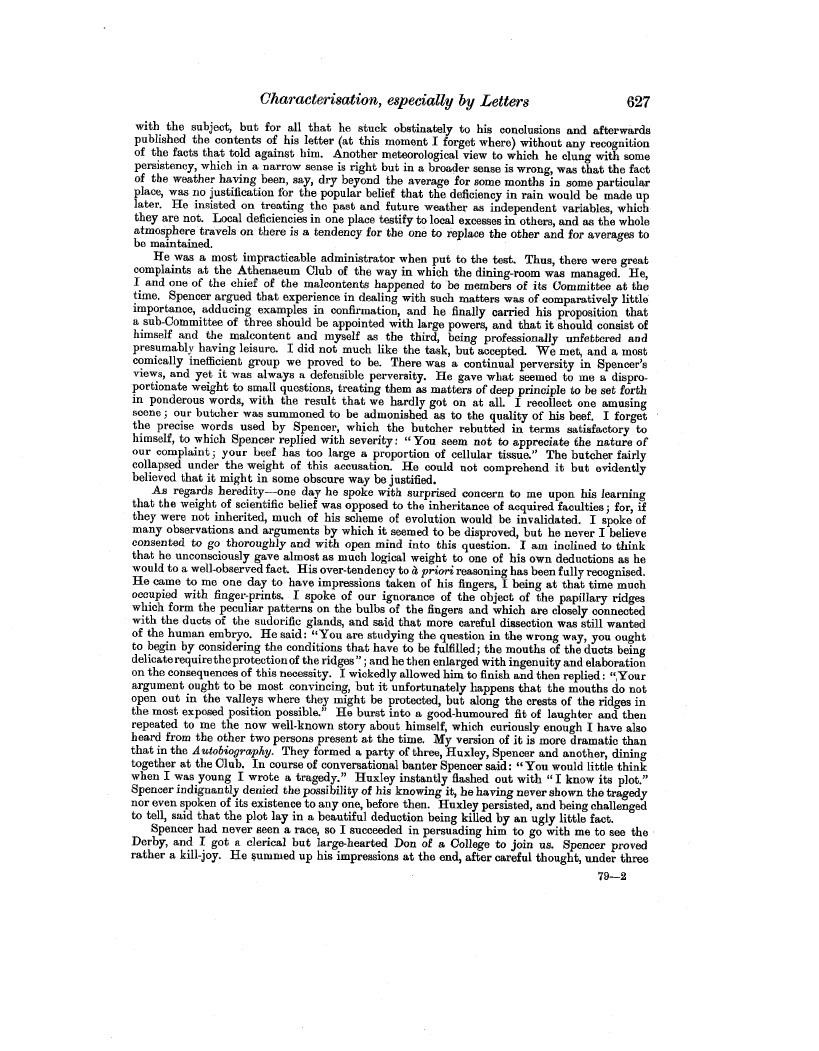| ||||||

OCR Rendition - approximate
Characterisation, especially by Letters 627 with the subject, but for all that he stuck obstinately to his conclusions and afterwards published the contents of his letter (at this moment I forget where) without any recognition of the facts that told against him. Another meteorological view to which he clung with some persistency, which in a narrow sense is right but in a broader sense is wrong, was that the fact of the weather having been, say, dry beyond the average for some months in some particular place, was no justification for the popular belief that the deficiency in rain would be made up later. He insisted on treating the past and future weather as independent variables, which they are not. Local deficiencies in one place testify to local excesses in others, and as the whole atmosphere travels on there is a tendency for the one to replace the other and for averages to be maintained. He was a most impracticable administrator when put to the test. Thus, there were great complaints at the Athenaeum Club of the way in which the dining-room was managed. He, I and one of the chief of the malcontents happened to be members of its Committee at the time. Spencer argued that experience in dealing with such matters was of comparatively little importance, adducing examples in confirmation, and he finally carried his proposition that a sub-Committee of three should be appointed with large powers, and that it should consist of himself and the malcontent and myself as the third, being professionally unfettered and presumably having leisure. I did not much like the task, but accepted. We met, and a most comically inefficient group we proved to be. There was a continual perversity in Spencer's views, and yet it was always a defensible perversity. He gave what seemed to me a disproportionate weight to small questions, treating them as matters of deep principle to be set forth in ponderous words, with the result that we hardly got on at all. I recollect one amusing scene ; our butcher was summoned to be admonished as to the quality of his beef. I forget the precise words used by Spencer, which the butcher rebutted in terms satisfactory to himself, to which Spencer replied with severity: "You seem not to appreciate the nature of our complaint; your beef has too large a proportion of cellular tissue." The butcher fairly collapsed under the weight of this accusation. He could not comprehend it but evidently believed that it might in some obscure way be justified. As regards heredity-one day he spoke with surprised concern to me upon his learning that the weight of scientific belief was opposed to the inheritance of acquired faculties; for, if they were not inherited, much of his scheme of evolution would be invalidated. I spoke of many observations and arguments by which it seemed to be disproved, but he never I believe consented to go thoroughly and with open mind into this question. I am inclined to think that he unconsciously gave almost as much logical weight to one of his own deductions as he would to a well-observed fact. His over-tendency to a priori reasoning has been fully recognised. He came to me one day to have impressions taken of his fingers, I being at that time much occupied with finger-prints. I spoke of our ignorance of the object of the papillary ridges which form the peculiar patterns on the bulbs of the fingers and which are closely connected with the ducts of the sudorific glands, and said that more careful dissection was still wanted of the human embryo. He said: "You are studying the question in the wrong way, you ought to begin by considering the conditions that have to be fulfilled; the mouths of the ducts being delicate require the protection of the ridges"; and he then enlarged with ingenuity and elaboration on the consequences of this necessity. I wickedly allowed him to finish and then replied: ",Your argument ought to be most convincing, but it unfortunately happens that the mouths do not open out in the valleys where they might be protected, but along the crests of the ridges in the most exposed position possible." He burst into a good-humoured fit of laughter and then repeated to me the now well-known story about himself, which curiously enough I have also heard from the other two persons present at the time. My version of it is more dramatic than that in the Autobiography. They formed a party of three, Huxley, Spencer and another, dining together at the Club. In course of conversational banter Spencer said: "You would little think when I was young I wrote a tragedy." Huxley instantly flashed out with "I know its plot." Spencer indignantly denied the possibility of his knowing it, he having never shown the tragedy nor even spoken of its existence to any one, before then. Huxley persisted, and being challenged to tell, said that the plot lay in a beautiful deduction being killed by an ugly little fact. Spencer had never seen a race, so I succeeded in persuading him to go with me to see the Derby, and I got a clerical but large-hearted Don of a College to join us. Spencer proved rather a kill-joy. He summed up his impressions at the end, after careful thought, under three 79-2
|